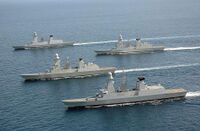Operation Infinite Reach
| Operation Infinite Reach | |||||||
|---|---|---|---|---|---|---|---|
 HMNV Salvation | |||||||
| |||||||
| Belligerents | |||||||
|
| Slavers | ||||||
| Commanders and leaders | |||||||
|
File:Lubbyflag1.png Vice Admiral Mira Janovna | Unknown | ||||||
| Strength | |||||||
|
Malgravean Royal Armed Forces Lubyakan Navy | Unknown | ||||||
| Casualties and losses | |||||||
| 35 | |||||||
|
| |||||||
Background
In the immediate aftermath of de-isolation the government of Nikola Tesla became increasingly aware of the presence of a highly organised and well financed international slave trade however at the time it was feared that the Malgravean Royal Navy lacked the capability and funding to go after such criminals so instead the Special Investigative Service was utilised to scout and when possible eliminate slave rings that threatened Malgravean national security and honour.
After the 2009 Malgravean Emergency Election it was decided that a more proactive stance had to be taken and the newly elected government decided to order a review of current naval activity with a mind for starting global operations. At the start of 2010 the report was finalised and Operation Infinite Reach was founded
Operation
During the early stages of the 2009 Malgravean Naval Force Evaluation it was discovered that the relatively small budget of the armed forces combined with the immense pressures of an operation of unlimited scope would put an excessive strain on the capability of the navy resulting in the defence of the mainland and the growing research colony being negatively impacted. In recent years this was used as a justification to scrap the military mission however for Operation Infinite Reach it was decided that a rotational approach would be used, with two specialised battle-groups formed that would receive fresh ships and crews whenever required.
Prime Minister Rachel Berry and the national parliament authorised the operation on January 1st 2010 with HMNV Wizna leading the first official battlegroup as part of Operation Infinite Reach the following week.
Following the loss of the HMNV Bastion, the Malgravean Navy sought aid from the Lubyakan Navy to provide both ships and logistical support to Operation Infinite Reach. The Lubyakan Navy created the High Seas Patrol Command to coordinate its additions for Infinite Reach operations.
Aftermath
It is unknown if Operation Infinite Reach has had a noticeable impact on the scale of the international slave trade, supporters have stated that the disruption of the trade has led to a lack of confidence in the market and claim that is a moral imperative for the nation to continue with the operation. On the other side critics of the operation deride the excessive cost of the operation and point to examples of increased breakdowns in the colonial fleet and the forced creation of a reserve fleet to place ships undergoing particularly heavy maintenance if they have endured combat or extreme weather conditions. The Dominion of the Lubyak also began forward basing of its ships in Malgrave to support Operation Infinite Reach.
Freestian Reinforcement
Under the auspice of Operation Waking Leviathan (OWL), the Freestian government declared under article 3 of the "Benarbor declaration" that various allied anti-slavery operations would be eligible for support by elements of the Freethinker Royal Armed Forces, primarily in the shape of combat vessels and auxiliaries of the Freethinker Maritime Forces.
The contingent naval force (defined as "Force Kilo") was relatively small by Freestian standards, comprised of thirty six combatants and sixteen supporting vessels. The largest vessels assigned, the carrier "FRNS Indignant", an Ironclad Class Aircraft Carrier, and the battlecruiser “FRNS Slight Regard”, were in fact too large to be effectively based in Malgravean ports and instead spent their station time at sea.
Force Kilo came under the overall command of the Malgravean navy during this period. Actual operational command remained in the hands of Freestian officers however.